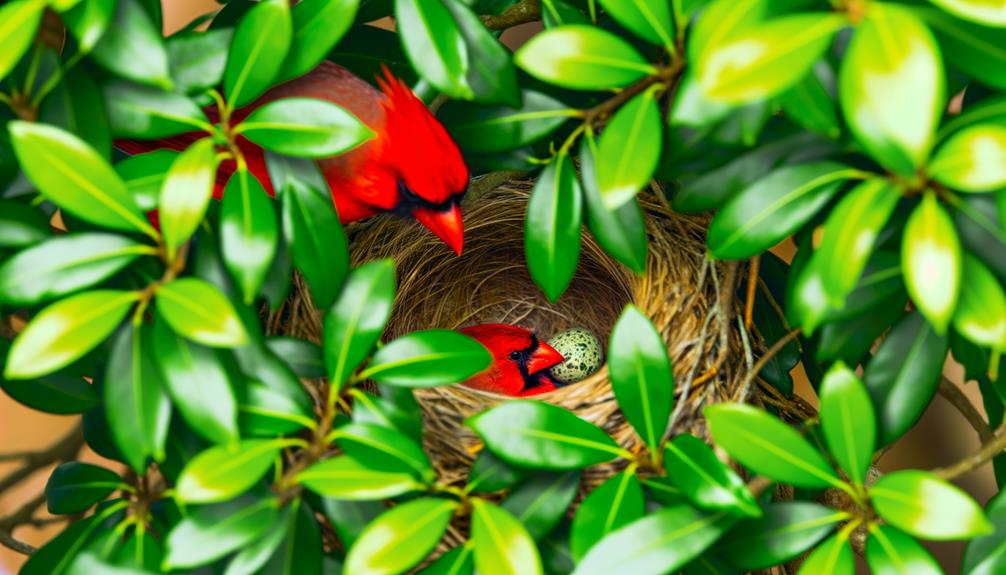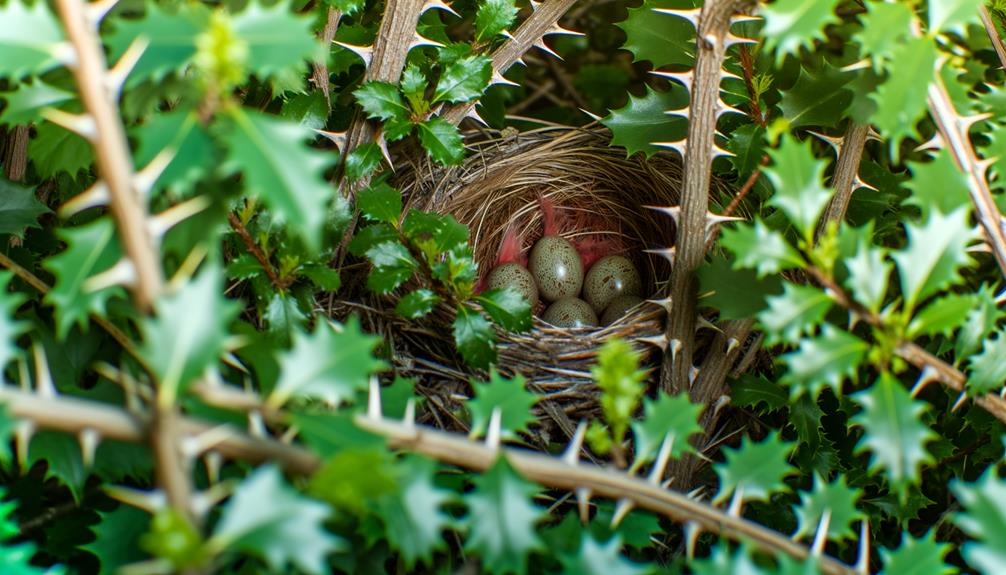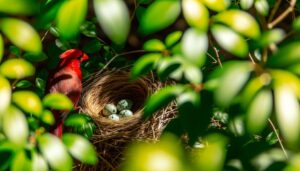Do Cardinals Eat Their Own Eggs?
Yes, cardinals can eat their own eggs. This behavior occurs due to nutritional deficiencies, aiming to regain essential nutrients.
Stress from predators or environmental disturbances might also trigger it. Sometimes, inexperienced parents accidentally break and consume the eggs.
Additionally, they might remove eggs showing signs of disease or genetic defects. Addressing nutritional needs and minimizing stressors can help prevent this behavior.
Interested in understanding deeper mechanisms and strategies to prevent egg loss? Keep going.

Key Takeaways
- Cardinals may eat their own eggs due to nutritional deficiencies.
- Environmental stress and disturbances can trigger egg consumption in cardinals.
- First-time parents may accidentally break and eat their own eggs.
- Diseased or genetically defective eggs might be removed and consumed.
- Egg consumption can be a survival strategy under adverse conditions.
Cardinal Nesting Habits

Cardinals typically build their nests in dense shrubs or tree branches, ensuring they're well-hidden from predators. You'll find that these nests are often constructed at heights ranging from 3 to 10 feet above the ground.
Females primarily handle the nest-building, using materials like twigs, leaves, and grass to create a sturdy structure. The interior is lined with softer materials such as vines and rootlets, offering a cozy environment for the eggs.
Cardinals usually select locations with dense foliage to provide added camouflage. By strategically choosing such sites, they maximize the chances of their offspring surviving.
Understanding these nesting habits allows you to appreciate the cardinal's resourcefulness and adaptability in safeguarding their future generations.
Factors Influencing Egg Consumption
While the nesting habits of cardinals showcase their dedication to protecting their eggs, several environmental and behavioral factors can lead to the unthinkable act of egg consumption. If food becomes scarce, cardinals might ingest their eggs to reclaim essential nutrients.
Stress from predators or environmental disturbances can also trigger this behavior. Additionally, first-time parents may accidentally break eggs during inexperienced nesting, prompting them to eat the damaged eggs.
Disease or genetic defects in the eggs might drive cardinals to remove compromised offspring from the nest, ensuring the survival of healthier chicks. Understanding these factors allows you to appreciate the complex decisions cardinals face in their natural habitat, balancing survival instincts with parental care.
Scientific Observations

Researchers have meticulously documented instances of cardinals consuming their own eggs, providing valuable insights into the conditions and behaviors that trigger this phenomenon. By observing these birds, scientists have identified several key factors that may lead to egg consumption:
- Nutritional Deficiencies: Lack of essential nutrients can drive cardinals to consume their own eggs to reclaim those nutrients.
- Stress and Disturbance: High levels of stress, often due to predators or human interference, can trigger this behavior.
- Inexperienced Parents: Younger or first-time cardinal parents might accidentally eat their eggs due to inexperience.
- Environmental Conditions: Extreme weather or habitat destruction can create conditions where egg consumption becomes a survival strategy.
These observations are important for understanding and mitigating factors that might lead to such unusual behavior in cardinals.
Comparisons With Other Birds
In comparing cardinals with other bird species, you'll find that egg consumption isn't unique to them and can be observed in various avian families under certain circumstances. Birds like herons, gulls, and certain raptors have also been documented eating their own eggs. This behavior often results from environmental stressors, nutrient deficiencies, or threats from predators.
For example, when food is scarce, a bird might consume its eggs to reclaim essential nutrients. Similarly, if a nest is disturbed, a bird might eat its eggs to prevent them from falling into the hands of predators. Recognizing these patterns helps you understand that such behavior is a survival strategy rather than an anomaly in the avian world.
Preventing Egg Loss

Understanding why birds, including cardinals, might consume their own eggs leads us to explore strategies for preventing such egg loss in both wild and captive settings.
By addressing key factors, you can help secure the survival of these eggs:
- Optimize Nutrition: Provide a well-rounded diet abundant in calcium and protein to prevent nutritional deficiencies that may lead to egg-eating behavior.
- Minimize Stress: Reduce environmental stressors by maintaining a stable, tranquil habitat.
- Nest Box Design: Use nest boxes with proper airflow and protection to deter predators and minimize disturbance.
- Regular Monitoring: Frequently monitor nests to promptly spot and address any emerging issues.
Conclusion
So, you've seen that cardinals don't typically consume their own eggs. Several factors, like stress and scarcity, might influence such rare behavior.
Scientific studies spotlight these scenarios, showing that cardinals usually protect their nests passionately. Comparing them to other birds, you'll notice similar patterns.
To prevent egg loss, guarantee a safe, serene habitat. By understanding these behaviors better, you'll strengthen bird habitats brilliantly, boosting their chances for successful breeding.






